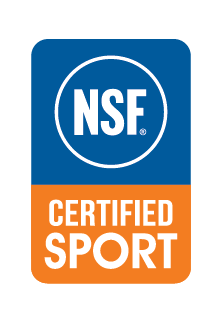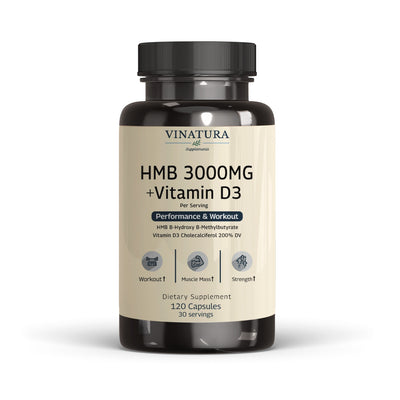
Can You Combine HMB and ATP Together?
HMB (beta-hydroxy beta-methylbutyrate) and ATP (adenosine triphosphate) are two supplements widely researched within the health and fitness community for their potential benefits in muscle building and performance enhancement. This article will explore the possibility of combining HMB and ATP to increase muscle mass and strength and better understand how and why using them together can be beneficial in the muscle-building process.
Before exploring further, please read the disclaimer located at the end of this webpage.
Key Takeaways
- HMB supplementation may promote muscle growth, reduce muscle breakdown, enhance exercise performance, and support lean mass gains. However, further research is needed to fully understand its effects.
- ATP provides energy for muscle contraction, is regenerated through multiple systems, and supplementation may support performance and muscle recovery.
- In a controlled study, the combined HMB and ATP supplements have been shown to significantly enhance muscle mass, strength, and recovery, highlighting their synergistic effects.
- When contemplating HMB and ATP supplementation, it's crucial to consider the possibility of infrequent side effects and the potential for limited additional advantages; seeking medical advice is essential.
Exploring HMB and Its Potential Benefits for Muscle Building

Have you heard of HMB? It's an intriguing compound that naturally occurs in your body when it breaks down leucine, an amino acid. The health and fitness community has taken notice of HMB due to its potential benefits in muscle growth and exercise performance. Here's a unique summary of the research findings on HMB:
- Muscle growth: HMB shows promise in promoting muscle growth, especially in individuals new to training or older adults engaging in resistance exercises.
- Reduced muscle breakdown: After intense workouts, HMB may help minimize muscle breakdown, which can be advantageous for muscle repair and recovery. HMB regulates muscle breakdown in some conditions of muscle wasting [4].
- Enhanced exercise performance: Some studies suggest that HMB supplementation could enhance exercise performance, increase strength, and boost power when combined with exercise routines.[1]
- Lean body mass: HMB supplementation might aid in increasing lean body mass, particularly in older, sedentary individuals. HMB is believed to impact strength and lean muscle mass by acting as an anti-catabolic agent, minimizing protein breakdown and cellular damage that can occur during intense training [2].
- Reduced risk of muscle damage: A study conducted on 20 men undergoing resistance training showed that the group supplemented with HMB before training could reduce the likelihood of muscle damage, potentially preventing decreases in training readiness [3].
- Decreased body fat: When used alongside exercise, HMB supplementation can reduce body fat. Supplementing HMB during weight loss may decrease fat mass without affecting glucose, fat, and protein metabolism during energy restriction [5].
It's worth noting that while some studies have shown promising results, the research on HMB remains mixed, and further studies are necessary to fully comprehend its effects on different populations.
If you're considering HMB supplements, it is advisable to consult with a healthcare professional to ensure they align with your individual health needs and fitness goals.
What is ATP and What Are Its Benefits for Muscle Building?

Let's delve into the fascinating world of ATP, or Adenosine Triphosphate, the primary energy carrier in all living organisms. ATP plays a vital role in muscle contraction and building. Here's an extraordinary exploration of how ATP benefits the process of muscle building:
- Energy for muscle contraction: ATP is the fuel that drives the biochemical reactions involved in muscle contraction. As muscles work, they consume ATP, necessitating its replenishment for sustained movement [7].
- Phosphagen system: Although muscle cells store a small amount of ATP that can be used instantly, it only lasts about three seconds. Muscles rely on creatine phosphate to rapidly regenerate ATP, which transfers a phosphate group to ADP, forming ATP [6].
- Glycogen-lactic acid system: Muscles store glycogen, a complex carbohydrate that can be broken down into glucose. This glucose is then utilized to produce ATP anaerobically, providing energy for approximately 90 seconds of intense activity.
- Aerobic respiration: The body employs oxygen to convert glucose into ATP through aerobic respiration to sustain muscle activity over extended periods. This process can continue as long as there is an ample supply of oxygen and glucose.
Supplementing with ATP may offer several benefits, including enhanced physical performance, and expedited recovery. While direct supplementation of ATP may not significantly increase its levels in muscle tissue, it can support the body's natural ATP production processes, thereby assisting in strength, endurance, and muscle building.
Remember, while ATP is indispensable for muscle function and building, it's always prudent to consult a healthcare professional before embarking on any new supplement regimen.
Can You Combine HMB and ATP to Enhance Muscle Mass and Strength?
HMB and ATP can be combined to enhance muscle mass and strength.
A study published in the Journal of Strength and Conditioning Research, conducted as a double-blind, placebo-controlled trial, examined the specific combination of HMB and ATP supplementation. Seventeen men participated in a 12-week program, followed by a tapering-off phase. Participants were rigorously assessed for physical characteristics such as body weight, lean muscle mass, strength, power, and jump tests.
The results showed that the supplemented group experienced a remarkable overall strength improvement, exceeding 20%. In contrast, the placebo group only saw a slight increase. The significant increase in lower body strength was particularly noteworthy, where the supplemented group displayed an impressive boost [8].
Thus, combining HMB with ATP to enhance muscle strength is promising. Always consult healthcare professionals before starting any new supplementation regimen to ensure they align harmoniously with your health needs and personal training goals.
Ultimately, while these supplements can enhance muscle building and strength, they work best when combined with a balanced diet and exercise program. Prioritizing consultation with healthcare professionals before initiating any new supplementation regimen is wise, ensuring they align harmoniously with your health needs and personal training goals.
Are There Downsides to Taking HMB and ATP Together?
Currently, no studies discuss potential side effects resulting from the combination of HMB and ATP. When evaluated individually, HMB is considered safe when used at 3g/day. While a dosage of 6g/day has not been fully validated, it still does not lead to serious consequences [9].
In contrast, ATP may cause adverse reactions such as rash, hives, itching, redness, chest pain, headache, and low blood pressure and may even negatively impact the stomach, causing discomfort, nausea, and constipation...
As with any supplement regimen, it's advisable to consult a healthcare professional before initiating supplementation, especially if you have underlying health conditions or are taking other medications. Always consider your individual health goals and needs when evaluating the use of supplements.
How Much HMB and ATP Should You Take?
Unleash the power of HMB (beta-hydroxy beta-methylbutyrate) and ATP (adenosine triphosphate) supplements with the following extraordinary dosage guidelines:
HMB Dosage:
- For individuals weighing up to 130 lbs (60kg), a daily dosage of 3 grams is typically sufficient. This amount can provide the desired benefits for muscle growth and preservation.
- If you weigh over 130 lbs (60kg), increasing the dosage to 4 grams per day is recommended. To optimize absorption, taking 1 gram at a time is advised, spreading the intake throughout the day. This means you would consume 1 gram of HMB four times daily.
ATP Dosage:
- Specific information regarding ATP dosage may be less readily available. However, studies investigating its effects on exercise performance and muscle strength have utilized dosages of 150-225 mg per day. These amounts have been used to assess the impact of ATP on enhancing physical performance.
Important reminders:
Remember that these dosages are general recommendations, and it's always prudent to consult with a healthcare professional before embarking on any new supplement regimen. They can offer personalized advice tailored to your needs and health status, ensuring optimal results.
Additionally, follow the manufacturer's instructions on the supplement label for the correct dosage. They provide specific guidance based on the product's formulation and potency.
Remember, while supplements can support your fitness goals, they should always be used with a balanced diet, regular exercise, and sufficient rest. These lifestyle factors work synergistically to maximize your progress towards a healthier and stronger you.
Conclusion
In conclusion, combining HMB and ATP can be an effective nutritional supplementation strategy to enhance health and athletic performance. HMB aids in enhancing recovery processes and protecting muscles, while ATP provides energy for physical activities. However, it's important to note the appropriate dosage and timing of use according to individual needs. Consulting a nutrition expert is advisable to obtain a safe and effective supplementation regimen.
References
- [1] Office of Dietary Supplements - Dietary Supplements for Exercise and Athletic Performance. (2016). Nih.gov. https://ods.od.nih.gov/factsheets/ExerciseAndAthleticPerformance-HealthProfessional/
- [2] Slater, G. J., & Jenkins, D. (2000). ??-Hydroxy-F128b-Methylbutyrate (HMB) Supplementation and the Promotion of Muscle Growth and Strength. Sports Medicine, 30(2), 105–116. https://doi.org/10.2165/00007256-200030020-00004
- [3] Wilson, J. M., Lowery, R. P., Joy, J. M., Walters, J. A., Baier, S. M., Fuller, J. C., Stout, J. R., Norton, L. E., Sikorski, E. M., Stephanie, Duncan, N. M., Zanchi, N. E., & Rathmacher, J. (2013). β-Hydroxy-β-methylbutyrate free acid reduces markers of exercise-induced muscle damage and improves recovery in resistance-trained men. British Journal of Nutrition, 110(3), 538–544. https://doi.org/10.1017/s0007114512005387
- [4] Per-Olof Hasselgren. (2014). β-Hydroxy-β-methylbutyrate (HMB) and prevention of muscle wasting. Metabolism, 63(1), 5–8. https://doi.org/10.1016/j.metabol.2013.09.015
- [5] Per-Olof Hasselgren. (2014). β-Hydroxy-β-methylbutyrate (HMB) and prevention of muscle wasting. Metabolism, 63(1), 5–8. https://doi.org/10.1016/j.metabol.2013.09.015
- [6] Chang, C.-K., Kao, S.-Y., & Wang, C.-Y. (2023). Beta-hydroxy-beta-methylbutyrate supplementation preserves fat-free mass in collegiate boxers during acute body mass loss. The Chinese Journal of Physiology, 66(6), 485–485. https://doi.org/10.4103/cjop.cjop-d-23-00074
- [7] C. (2015). Elsevier EBooks, 65–104. https://doi.org/10.1016/b978-0-12-420169-9.00003-5
- [8] Effects of 12 weeks of beta-hydroxy-beta-methylbutyrate free acid, adenosine triphosphate, or a combination on muscle mass, strength, and power in resistance trained individuals. (2022). Journal of the International Society of Sports Nutrition. https://www.tandfonline.com/doi/full/10.1186/1550-2783-10-S1-P17
- [9] Nissen, S., Sharp, R. L., Panton, L., Vukovich, M., Trappe, S., & Fuller, J. C. (2000). β-Hydroxy-β-Methylbutyrate (HMB) Supplementation in Humans Is Safe and May Decrease Cardiovascular Risk Factors. Journal of Nutrition, 130(8), 1937–1945. https://doi.org/10.1093/jn/130.8.1937
Author

Product Disclaimer
Including an ingredient or study does not evaluate, endorse, or recommend any Vinatura product or any third-party product. Some ingredients discussed may not be used in any Vinatura product.
The content of the articles has not been evaluated by the Food and Drug Administration (FDA) and is not intended to promote or endorse any specific product. Any products sold on this website are not intended to diagnose, treat, cure, or prevent any disease.
Opinions and Endorsements
Any claims, statements, or opinions expressed in the articles are those of the author(s) and do not necessarily reflect the views or opinions of the manufacturers of the dietary supplement products. The products sold on this website are separate from the content of the articles and are not directly endorsed or associated with the information presented here.
Liability Disclaimer
The author(s) of the articles, website, and manufacturers of the dietary supplement products do not assume any liability for any potential consequences arising from the use of the information provided in the articles. Ingredient effects, dosages, and safety vary by individual, formulation, and context; some ingredients interact with medications or may be unsuitable during pregnancy or lactation. It is recommended that individuals consult with a qualified healthcare professional before making any dietary or lifestyle changes, including the use of dietary supplements.
Product Usage
Please refer to the product labels and packaging for specific usage instructions and guidelines for the dietary supplement products sold on this website.
Customer Support
For any concerns or questions regarding the dietary supplement products, please contact our customer support team, who will be more than happy to assist you.






Leave a Comment
Be the first to comment.
What do you think?